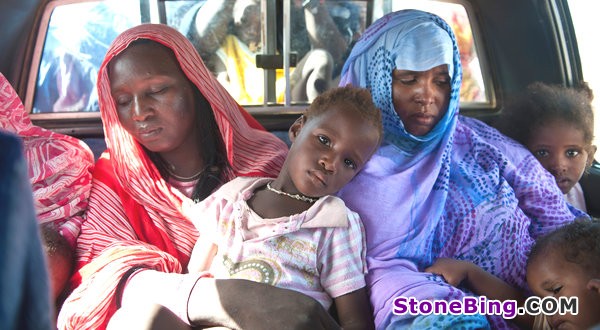
FASSALA, Mauritania — A column of 30 pickup trucks crammed with people fleeing Mali snaked through this border town early Wednesday, a replay of a much-repeated scene as the refugees’ desert homeland collapsed further into factional chaos.
There were over 1,000 in Wednesday’s procession, joining more than 90,000 who have already fled through this mud-brick village, the closest haven to the armed free fall on the other side. They were on their way to the United Nations refugee camp at Mbera, 20 miles away.
Still, it was the newest arrivals’ first taste of release from a nightmarish world across the border where Islamist extremists preaching Shariah flog nonbelievers publicly in the ancient town of Timbuktu, armed men circulate to enforce the new order, and other factions threaten to take the vast and rapidly emptying territory back.
The International Criminal Court said Wednesday that it was looking into whether it had jurisdiction over reported atrocities by armed rebels in the north of the country after a delegation of Malian government officials, including Malick Coulibaly, the minister of justice, visited the court’s headquarters in The Hague to file a formal request. The document alleged “grave and large-scale violations of human rights and of international humanitarian law, committed notably in the north of the country.”
At the Mauritania-Mali border, refugees were too tired, hungry and ragged to celebrate their departure from the turmoil. All they could speak of was the fear that had pushed them out — of the Islamists who have taken over, and of the simmering civil war that appears to loom.
They had seen men with guns over the last days, circulating in the backs of trucks — whether it was the long-bearded Islamists of the Ansar Dine group or the Tuareg rebel movement — the National Movement for the Liberation of Azawad, known as the M.N.L.A., who first conquered the territory, defeating the Malian Army in March.
“Night and day there is gunfire,” said Ne Zima, 28, who had fled the town of Goundam, west of Timbuktu, and was jammed into the back of a pickup truck with two other young women. They decided to leave after the Islamists suppressed a demonstration in the streets of Goundam. A woman, struck by one of the new masters, had dropped her baby and the residents rose up, residents said.
Several were killed. “I saw two bodies in the street,” said Tahia Mohamed Lemine, 30. “Many were wounded.”
“Fear brought me here,” said Ely Ould Mohamed, who raises goats and fled Lerneb, a village between Goundam and the Mauritanian border.
“There’s M.N.L.A. and Ansar Dine in my zone. Nothing is going right. Most people have already left. And the people are living miserably.” He was standing in the back of a pickup with his wife and five children, and had traveled six days by donkey cart to reach the border.
“People are living in fear, and they are leaving,” said Abuba Ag El Mostapha, a farmer of 65 who had come with five children from Duenza, south of Timbuktu. He spoke of numerous arrests in the town carried out by the Gandakoy, an armed faction that has allied itself with the Islamists.
In the document filed in The Hague, Malian officials reported “summary executions of soldiers, rape of women and young girls, massacres of civilians and the use of child soldiers and pillage.” Also documented were the destruction of hospitals, courts and schools as well as attacks on churches, tombs and mosques.
Fatou Bensouda, the court’s chief prosecutor, said she had instructed her staff to act quickly to establish if the court can have jurisdiction in the case, which made Mali the fourth African country to bring a case of its own volition to the court.
At the border, dozens of the very newest arrivals squatted patiently under a metal-roofed shelter, waiting to be registered in a few dusty adjoining outbuildings at the edge of the village, in an operation overseen by the United Nations. They then received a quick medical checkup, with the children’s tiny arms measured by a nurse for malnutrition.
One by one, the refugees trickled in to the registration building. “We don’t even know who to be afraid of anymore, the Salafists, the M.N.L.A., or the Mali army,” said Hama Ould Mohamed Bechir, standing in front of the desk. He had just fled the town of Léré, where M.N.L.A. officials recently claimed they were in control.
“There are a lot of armed people, coming and going all the time,” he said, including the men with long beards — the Islamists. “There’s some of everything,” said Mr. Bechir, who raises livestock.
Ely Ould Sidati had seen a lot of armed men at Léré — especially the bearded ones. He had heard gunshots, too. “I’m afraid, afraid of the war. We don’t want to be victims,” said Mr. Sidati, a shopkeeper.
Marlise Simons contributed reporting from Paris.







